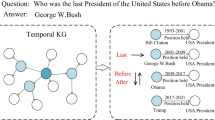Abstract
This paper presents the evaluation of a QA system for the treatment of complex temporal questions. The system was implemented in a multilayered architecture where complex temporal questions are first decomposed into simple questions, according to the temporal relations expressed in the original question. These simple questions are then processed independently by our standard Question Answering engine and their respective answers are filtered to satisfy the temporal restrictions of each simple question. The answers to the simple decomposed questions are then combined, according to the temporal relations extracted from the original complex question, to give the final answer. This evaluation was performed as a pilot task in the Spanish QA Track of the Cross Language Evaluation Forum 2004.
This paper has been supported by the Spanish government, project TIC-2003-07158-C04-01.
Preview
Unable to display preview. Download preview PDF.
Similar content being viewed by others
References
Breck, E., Burger, J., Ferro, L., Greiff, W., Light, M., Mani, I., Rennie, J.: Another sys called quanda. In: Ninth Text REtrieval Conference, Gaithersburg, USA, November 2000. NIST Special Publication, vol. 500-249, pp. 369–378. National Institute of Standards and Technology (2000)
Mani, I., Wilson, G.: Robust temporal processing of news. In: ACL (ed.) Proceedings of the 38th Meeting of the Association of Computational Linguistics (ACL 2000), Hong Kong (October 2000)
Radev, D., Sundheim, B.: Using timeml in question answering (2002), http://www.cs.brandeis.edu/~jamesp/arda/time/documentation/TimeML-use-in-qa-v1.0.pdf
Saquete, E., Martínez-Barco, P., Muñoz, R., Vicedo, J.L.: Splitting complex temporal questions for question answering systems. In: ACL (ed.) Proceedings of the 42nd Meeting of the Association of Computational Linguistics (ACL 2004), Barcelona, July 2004, pp. 567–574 (2004)
Saquete, E., Martínez-Barco, P., Muñoz, R., Vicedo, J.L.: Multilayered question answering system applied to temporality evaluation. Procesamiento del Lenguaje Natural 33, 25–34 (2004)
Saquete, E., Mun̄oz, R., Martínez-Barco, P.: Terseo: Temporal expression resolution system applied to event ordering. In: Matoušek, V., Mautner, P. (eds.) TSD 2003. LNCS (LNAI), vol. 2807, pp. 220–228. Springer, Heidelberg (2003)
Eighth Text REtrieval Conference, Gaithersburg, USA, November 1999. NIST Special Publication, vol. 500-246. National Institute of Standards and Technology (1999)
Vicedo, J.L., Izquierdo, R., Llopis, F., Muñoz, R.: Question answering in Spanish. In: Peters, C., Gonzalo, J., Braschler, M., Kluck, M. (eds.) CLEF 2003. LNCS, vol. 3237, pp. 541–548. Springer, Heidelberg (2004)
Author information
Authors and Affiliations
Editor information
Editors and Affiliations
Rights and permissions
Copyright information
© 2005 Springer-Verlag Berlin Heidelberg
About this paper
Cite this paper
Saquete, E., Vicedo, J.L., Martínez-Barco, P., Muñoz, R., Llopis, F. (2005). Evaluation of Complex Temporal Questions in CLEF-QA. In: Peters, C., Clough, P., Gonzalo, J., Jones, G.J.F., Kluck, M., Magnini, B. (eds) Multilingual Information Access for Text, Speech and Images. CLEF 2004. Lecture Notes in Computer Science, vol 3491. Springer, Berlin, Heidelberg. https://doi.org/10.1007/11519645_58
Download citation
DOI: https://doi.org/10.1007/11519645_58
Publisher Name: Springer, Berlin, Heidelberg
Print ISBN: 978-3-540-27420-9
Online ISBN: 978-3-540-32051-7
eBook Packages: Computer ScienceComputer Science (R0)




